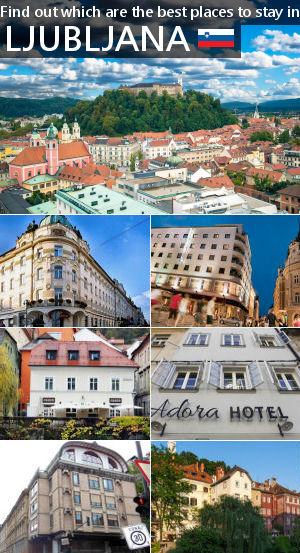Introducing The Idrija Lace School
The town of Idrija in western Slovenia is known for two things, the first being its mercury mine and the second is the centuries-old tradition of lace making.
The discovery of the what would grow to become the second largest mercury mine in the world in the end of the 15th century led to almost 5 centuries of prosperity and growth associated with the mining industry, while a very unique lace making tradition developed amongst the wives and daughters of miners. The tradition finally led to the creation of a lacemaking school in 1876. For the first time, lace making wasn’t just passed down from generation to generation, but became formally taught in school.
The first written mentions of lacemaking in Idrija date back to the 17th century. Miners and mining engineers from around Europe flocked to Idrija looking for work. Many came with their wives. It is thought that these women, particularly those from present-day Germany and the Czech Republic, brought an important tradition with them: the skill of lace making.
The Idrija Lace School is a recognized and valued institution among professional circles in Europe. It offers quality education for students and adults in lace-making, maintains and develops this rich treasury of knowledge, and consequently enhances the quality of the lace produced in Idrija. Continuing education and development of lace-making techniques has become a significant part of transmitting heritage.
The first head of the Idrija Lace School was Ivanka Ferjancic. She introduced a new lace making technique that used seven pairs of bobbins – a technique that became typical of Idrija lace making. But it wasn’t just the unique technique that set the Idrija lace apart from other laces: the detailed design patterns of Idrija lace were also very specific, and the handmade products became appreciated all over Europe and beyond for their beauty and quality. They attained an international reputation and were exported all over the world.
Nowadays, the Idrija Lace School is part of the Jurij Vega Grammar School and still helps to keep this important local tradition alive by passing lace making skills on to the younger generations. Successful young lace makers are coming up with exciting new designs based on reinterpretations of the traditional Idrija lace. The importance of the Idrija lace to the town of Idrija and the whole country of Slovenia was demonstrated when the Slovenian government decided to grant the lace official ‘geographic designation’, ensuring that only lace made in Idrija using traditional lace making technique can be sold as authentic Idrija lace. More than 450 children and 160 adult students have come to try their hand at crafting intricate bobbin lace in Idrija over the past half-decade. Some arrive from as far afield as South Africa and the United States.
In the school, there’s a showroom where visitors can see the remarkable pieces made by students of the school. The entrance fee is €2,5 for adults. You can also buy lace here – There’s a small shop with items for purchase. Both the showroom and the shop are open on Mondays, Tuesdays, Thursdays, Fridays, Saturdays from 9.00 to 12.00 and on Wednesdays from 9.00 to 19.00.
Lace has always been a valuable product combining skill, accuracy, patience, and aesthetics. Each piece is an eye-catching monument to its creators: the designer, pattern maker, and lace maker. It is valued as a cultural and ethnological treasure that must be preserved and at the same time developed and further improved through the creative knowledge of modern design. And if you would like to know even more about the Idrija lace, don’t forget to visit the Gewerkenegg castle in the middle of the town, where a part of the Municipal Museum is dedicated to lace.
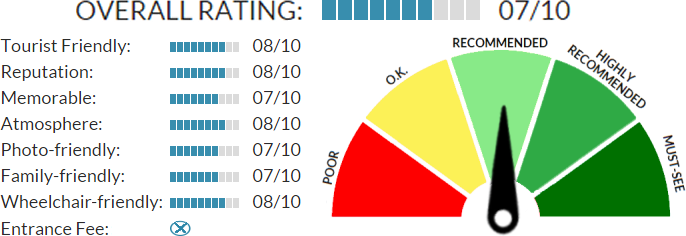
Idrija Lace School Pictures
View our image gallery with high-resolution photos!
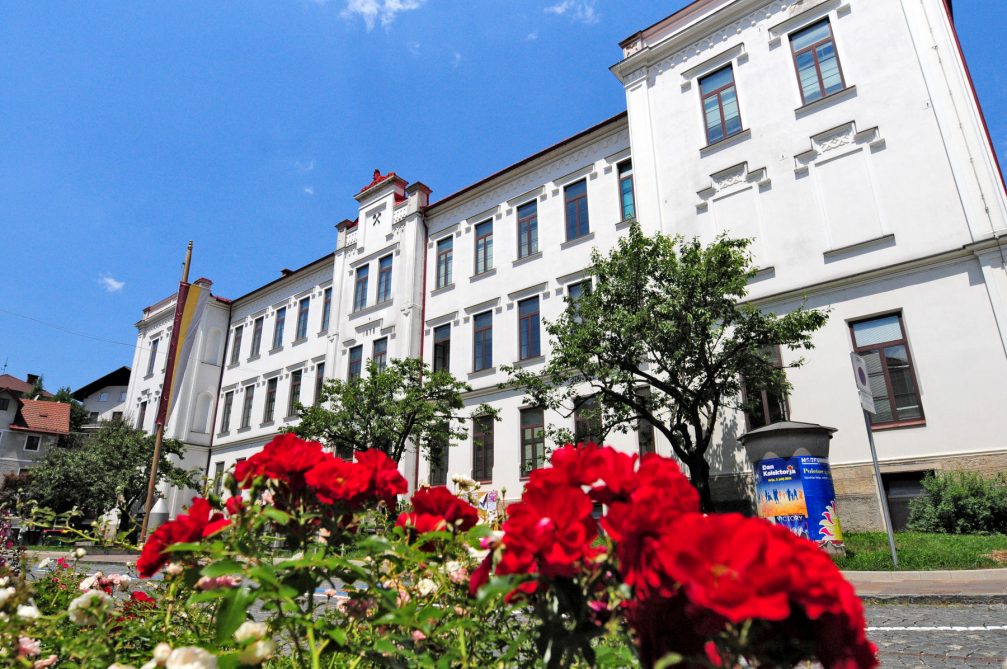
The lovely Neoclassical building of the Idrija Lace School. (Image by Dunja Wedam)
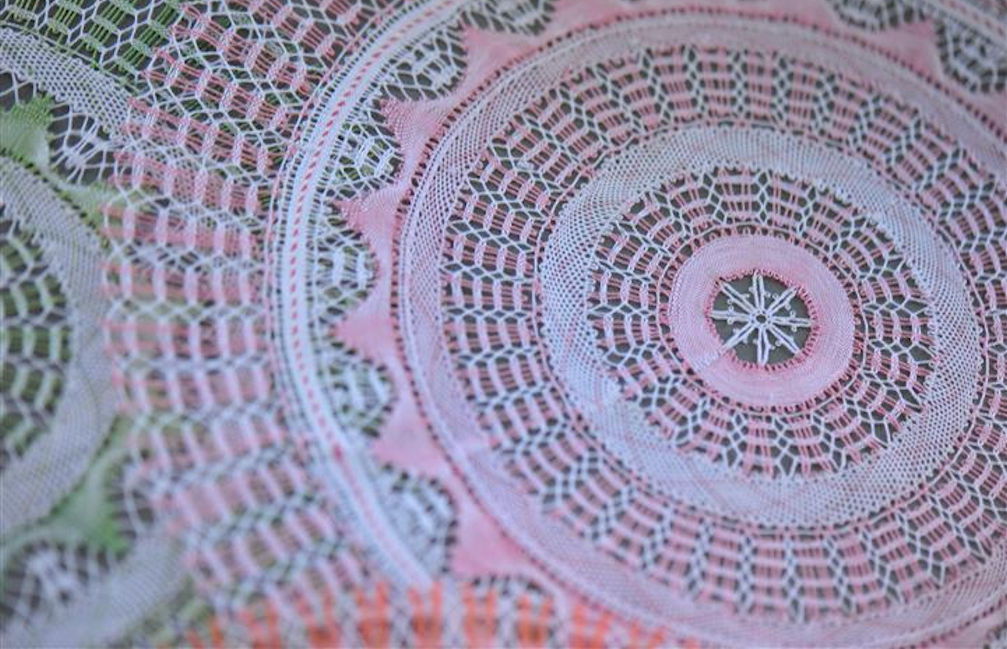
A piece of lace. (Image by Zoran Abram)
Location of the Idrija Lace School on the map
Address: Prelovceva ulica 2, 5280 Idrija, Slovenija
Latitude and Longitude Coordinates: 46.001101, 14.0206
GPS coordinates: 46° 0′ 3.9636” N 14° 1′ 14.16” E
Traditional region: Littoral (Slovene: Primorska)
Statistical region: Gorizia
Municipality: Idrija
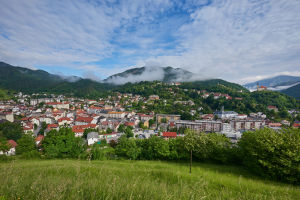 Idrija is a lovely small town with a population of just under 6,000 in western Slovenia that lies at the base of a valley, amid green hills and is crossed by the Idrijca river. It has a typical central-European architecture and you can see a strong influence of the Austro-Hungarian empire, especially in the town's main buildings. Today, Idrija is best known for three things: a mercury mine (the reason for Idrija's spot on UNESCO's World Heritage list), intricate locally made lace and zlikrofi (a traditional Slovenian dish from Idrija). |
| |
|---|
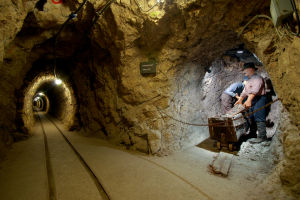 Overall Rating: The history of mining in Idrija dates back to 1490. Until the First World War Idrija's Mercury Mine was one of the best technically equipped mines in Europe. In 1986 the decision was made to close the mine. Today, visitors can tour a portion of the closed mine, called Anthony's Shaft, and learn about the difficult conditions endured by the mercury miners from the end of the 15th century till the end of the 20th century. |
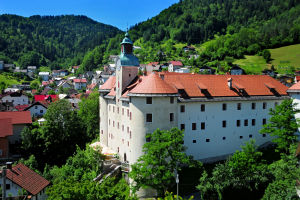 Overall Rating: The Gewerkenegg Castle stands atop a small hill on the western edge of the small mining town of Idrija in western Slovenia. It was built between 1522 and 1533 to serve as the administrative headquarters of Idrija's mercury mine. Today, the castle houses the award-winning Idrija Municipal Museum featuring the excellent collections which deal with mercury, lace and Idrija's history.. |
 Overall Rating: One of the most interesting examples of mining technology that still exists in Idrija is the Kamst, an impressive waterwheel made of wood in 1790 to pump the water out of flooded mineshafts below. With a diameter of 13,6 meters, it is the largest preserved wooden waterwheel in Europe. It operated uninterrupted for 158 years until 1948. It stands on its original location in a stone building on the western outskirts of town. |
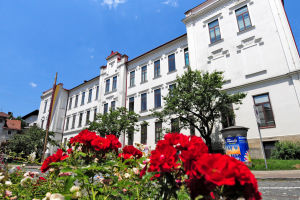 Overall Rating: The Idrija Lace School is a recognized and valued institution among professional circles in Europe. It offers quality education for students and adults in lace-making, maintains and develops this rich treasury of knowledge, and consequently enhances the quality of the lace produced in Idrija. In the school, there's a showroom where visitors can see the remarkable pieces made by students of the school. There's also a small shop with items for purchase. |
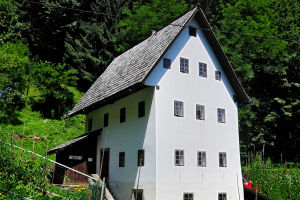 Overall Rating: The history of Idrija's days as a mining town is apparent in the numerous sights in the town and its surroundings. One such very interesting sight to visit, representing the former way of life of miners' families, is the 18th-century Miner's House, or Rudarska Hisa as it is called in Slovene. It stands in the Bazoviska street on a slope facing the town below, not far from Idrija's town centre. |
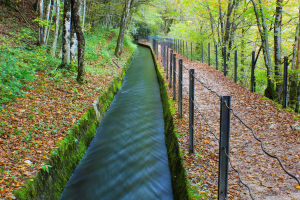 Overall Rating: The Rake water channel in Idrija was built at the end of the 16th century to support the mercury mine operations. Initially, the water channel was wooden, but in the second half of the 18th century it was enclosed with stone. Along the water channel, there's a two-and-a-half-kilometre-long nature learning path unveiling Idrija's treasures of geology, flora and cultural history.. |
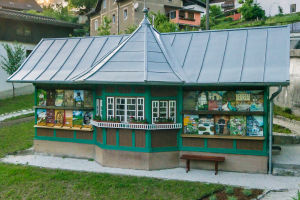 The Idrija Municipal Apiary stands behind the Church of the Holy Trinity, only a short walk from the center of Idrija. This highly crafted and extremely well executed and painted apiary is one of the most important structures of Slovene beekeeping. It was built in 1925 and completely renovated in 2013. |
| |
|---|
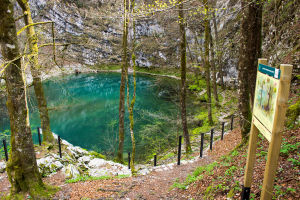 Overall Rating: Wild Lake or Divje Jezero as it is called in Slovene is a very unique and mysterious karstic lake located in Idrijski Log near the town of Idrija in western Slovenia. Since 1967, the lake has been protected as a natural monument of national significance of Slovenia. In 1972, the area of the lake was arranged into the first Slovenian outdoor museum in nature. In 1997 divers descended to 170 meters (558 feet), yet did not reach the bottom. |
| The accommodation options in Idrija can be divided into six main categories: hotels, guest houses, B&Bs, apartments, farm stays and hostels. |
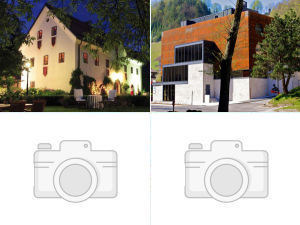 There are two hotels in the Idrija area. We have reviewed and rated them both, so, if you're planning to visit Idrija and would like to stay in a hotel, read on and find out which one best suits your needs. |
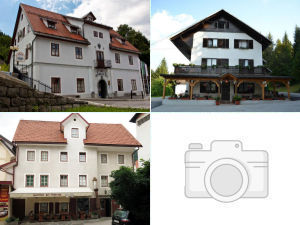 Guest houses are a very popular form of lodging in Slovenia and have been in use for many decades. We stayed at four different guesthouses in the Idrija area and would like to recommend two of them. |
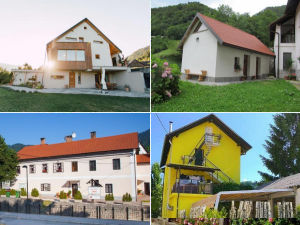 If you like complete privacy, comfort, want to be able to cook your favourite meals, or just look for a cheaper and better alternative to hotels, then Idrija apartments are meant for you. They usually have nice modern furniture and all the necessary equipment, including a well equipped kitchen and a modern bathroom. |
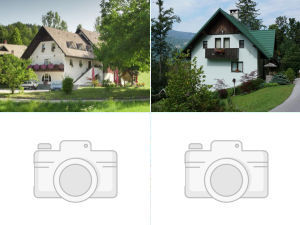 Bed and breakfasts are an inexpensive and relaxing alternative to a classic hotel for your stay, but currently we can recommend only one B&B in Idrija. |
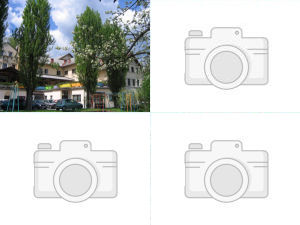 Idrija is a small town and only has one hostel. Find out if it suits your needs. |
 Farm stays are a great way of bringing your family together and experiencing another way of living. Find out which farm stay in the Idrija area we recommend! |


